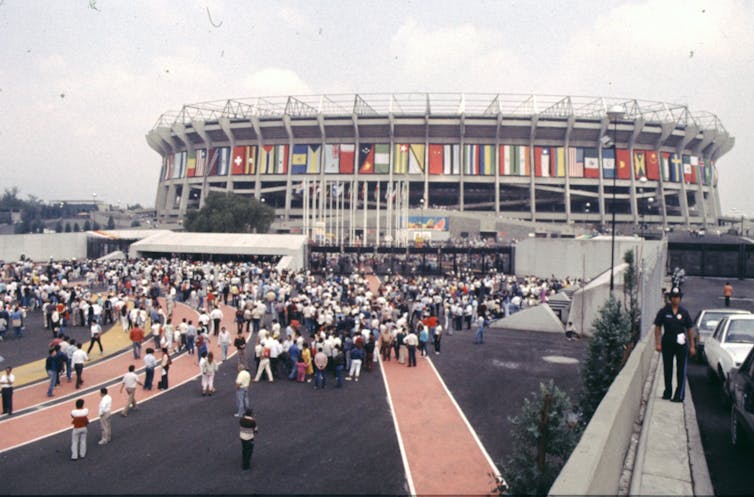The young Gail Emms, who would later become world badminton champion, was great at sport. At school, she once proudly gave a detailed presentation about how her mother, Janice, had played football for England in a World Cup in the early 1970s. Her teachers enjoyed the story but thought Gail was fantasising. There was no official record of any such event taking place.
However, Janice Emms did indeed play for an England football team in Mexico City in 1971 – and in front of a crowd of 90,000 at that. The women and girls concerned hid their involvement because football’s world governing body, Fifa, disapproved, and England’s Football Association (FA) sought to ban those who had participated in this “unsanctioned” tournament.
The players involved seldom talked about Mexico later, even among themselves. But those who had been there would never forget it.
Copa 71, a new documentary film about this long-forgotten landmark tournament, lists US soccer star Alex Morgan and tennis legends Serena and Venus Williams as executive producers. It premiered recently at the British Film Institute and, to some acclaim, at the Toronto International Film Festival.
Released on March 8, it interviews some of those involved and emerges at a moment when the women’s game is experiencing unprecedented commercial and popular success. The Women’s World Cup is now a major money-spinner and a global TV event, and Fifa has even embraced women’s football as the “future” of the game. Times have changed.
‘British Independents’
In the early 1970s, Italian drinks company Martini Rosso identified untapped commercial and marketing potential in women’s football. It argued for a privately funded international tournament in Mexico in 1971 – promising to pay for the kit, travel and accommodation of any Europeans willing to be involved.
Six countries took part, including four from Europe. In England, there was little point engaging with the FA on such matters: women’s football had been banned there for 50 years, and it was barely on the national agenda again. So, a Mr Harry Batt from Luton was contacted instead.
Early women footballers remember Batt fondly as a chain-smoking, rather sweary bus driver in his sixties. He and his wife, June, had started up the Chiltern Valley Ladies football club in 1969. An unlikely moderniser, Batt had recognised the demand among young women in his area for a chance to play, and built a successful and competitive regional club.
So, when the man from Martini Rosso came calling and asked Batt if he could put a squad together to represent England in Mexico, he jumped at the chance. Batt’s scratch team of so-called “British Independents” ranged in age from the 13-year-old Leah Caleb to a handful of more mature women players. Parental approval was needed for some squad members even to travel.
Did Batt really know what he was doing? His inexperienced and youthful team had only ever performed in charity matches or on uneven park pitches in front of a smattering of dogs, friends and family members. Children played alongside adults because of the paucity of women players; there was nowhere decent even for female players to change.
In Mexico City, this patchwork 14-player squad – by now re-labelled as England – played between daft pink-and-white goalposts in some of the largest stadia in the world, in front of enormous and enthusiastic crowds. The England women suffered injuries and lost their matches, but respect for them abroad grew.

Disappearing from view
And Batt’s reward for all this promoting of women and girls’ football in the international spotlight? A rebuff from Fifa and a lifetime ban from the FA. Thanks for nothing.
The New York Times had billed the Mexico tournament as “Soccer Goes Sexy South of Border”, with women’s football depicted as “a mixture between a sports event and a beauty contest … the shorts will be as close as possible to hot pants”.
But in fact, these international women footballers appear to have been as revered in Mexico as were men players. Some 112,000 fans watched Denmark defeat Mexico 3–0 in the final. Autograph hunters and TV presenters followed every step of the visiting England team.
After this sort of adulation, coming home was a real let-down. Mexico ‘71 had barely registered in England.
It took the dinosaurs at the FA another decade, under protest, to take the women’s game in-house, and a blundering Fifa 20 years to organise the first official Women’s World Cup, in China. So many wasted years.
![]()
John Williams does not work for, consult, own shares in or receive funding from any company or organisation that would benefit from this article, and has disclosed no relevant affiliations beyond their academic appointment.



